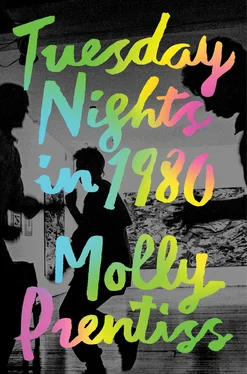Then she shoved a book into Engales’s chest, earmarked at a Lucian Freud painting.
“Study it,” she said. “That’s how you paint a fucking face.”
No one had ever cared enough to tell Engales that something he was making was a piece of shit before, and he coveted it. He had protested for show, but then had studied the Freud painting deliberately, running his finger over the smooth page, noting the way the unfinished background eclipsed the face itself, and how the shadows hung so haphazardly on the skin. It was unclear whether the painting was even finished, but Engales felt that it was the white negative space that made the painting wonderful. It was the world threatening to obliterate the painting’s subject, the universe licking at the subject’s face, about to swallow him whole. An understanding swept through Engales, and not unhappily: he was not yet great, but greatness was out there; it was available. He had then thrown his own canvas — the first real canvas he had ever painted on — into the studio’s big trash bin and started over. From across the room he had heard Arlene say, “Atta boy.”
After that, Arlene quickly became the sort of friend one needed in New York: the friend who told you things how they were, not how you wanted them to be, but only did so because she actually respected you — otherwise, it wouldn’t have been worth her time. (In New York, Engales soon learned, time was a currency potentially more valuable than actual money; everybody claimed they needed more of it.) Arlene informed him of all the times when the studio was not being used for classes (“ ’Cause Lord knows you don’t wanna get tangled up with that whole gang of little shits,” she said). She swore a lot: she swore at her canvases and swore at Engales and swore she’d never paint again. But she was always back the next day, toting ham sandwiches for the both of them, so they’d never have to stop working. They painted alongside each other for insanely long stretches, sometimes until the edges of the morning.
It was Arlene who had found him the free apartment; her friend François, a French essayist who had headed back to the old country for an indefinite number of months, agreed to entrust Engales with his place because he had a je ne sais quoi … energie positif . It was Arlene who had showed him the graffiti in the subway tunnels and the Egyptian wing of the Met, where “the hieroglyphics would blow his fucking brains out,” and the best place to get pesto pizza at 4:00 A.M. (“Pesto is a thing, right now,” she had said), and the way to call for free from a pay phone using a secret 800 number (“Look for the little blue box. It means the phreaks have hacked it”). She had taught him how to make real skin color (add the tiniest spot of blue), and how to “keep painting even when you hated it more than your uncle Booth.” (“Who’s Uncle Booth?” Engales had asked, and she had just said, “Never mind, but you’d hate him.”) They went to poetry readings at A’s — a loft space started by the Other Arleen, as she called her prolific artist friend, who wrote poems made of sounds and made videos on an 8mm camera and performed at MoMA, which made Arlene Number One “cringe and hoorah at the same time.” They frequented Eileen’s Reno Bar, where men dressed as ladies and the drinks were as stiff as the bulges in the ladies’ underwear; he’d paint the man-ladies the next day, their hairy thighs and their beautiful red lips, sucking down their fiery gin martinis. It was Arlene who had taken him to the place that would for the next seven years define him and his experience: the cereal factory turned abandoned building turned party destination turned living quarters, lovingly referred to by its dwellers as simply the squat.
PORTRAIT OF THE SQUAT BY AN ORPHAN
EYES: The windows, busted out, are unable to close their lids. Hence: blue tarps and duct tape, till someone sells a piece and they can buy a sheet of glass. Electricity rigged by Tehching, another of the squat’s resident nonresidents, who clipped the wires from across the street, ran them over: minimal sparking, no fires. Cheers to Tehching: a party, with lights(!), in his honor. Tehching, whose projects each lasted a year: live inside a wooden cell for a year, live outside for a year, and now: take a photograph of himself every hour of every day for this year, while he punches a time clock. Tehching, whose hair will grow out as the pictures progress, showing the passage of the year in just minutes. Who will eventually renounce art in his life, since his life had disappeared into art itself: that blurred horizon each and every artist hoped to reach, that only the luckiest or truest of them would.
NOSE: Resin, glue, paint, booze, day-old spaghetti sauce, and stale smoke. Smells that live in the building like its residents do: with the staunch conviction that they shall stay. No one can tell the smells of the squat to leave. They are as intrinsic to the space as the artists are, who stay up all night to make banners to hang outside that read THIS LAND IS OURS.
MOUTH: Laurie Anderson’s mouth glows red when she sings. Ah ah ah ah ah ah ah. Laurie Anderson’s mouth glows red when she sings. She taps out her own rhythm on the stick of her microphone. Ah ah ah ah ah. Her voice is being processed by some sort of computer machine: it is both music and nonmusic, sound and mood. Whoooooop. Doooooooah. The abandoned building moves its abandoned limbs to the sound that comes from that mouth, the sound that moves through that computer machine and out into the bones of the humans the abandoned building holds. The bodies no longer belong to their owners anymore, but instead to Laurie Anderson’s glowing mouth.
HAIR: Selma Saint Regis cuts hers off in the squat’s bathroom, frames it, leaves it on Mary Boone’s doorstep, never to hear from it again.
BODY: A projection, on the west wall of the squat’s biggest room, of a man dancing in a party hat. He’s naked, his flabby body slapping at itself. The artist herself, who comes into the frame from time to time to dance with the man, refuses to be named or acknowledged. Her face is never visible. The man is vulnerable and aggressive in his movements. The artist is guarded and careful in relation to the camera, but provocative in relation to the man: jutting out her hips. The video ends when she takes a wad of cash from the man, who looks up at her longingly from the edge of the bed, his face suddenly sweet, sad, and guilty, all at once. Then there’s a close-up of her hands, scrawling something on a matchbook. Shake it baby, oh, shake it, she writes, her hands shaking.
LIMBS: I’ll draw on yours if you draw on mine. This from Jean-Michel Basquiat, who holds out his smooth arm to Raul Engales during one of the squat’s better parties. The two painters square off, level into each other with their eyes. Jealousy fights with desire fights with schoolboy giddiness: they are each looking into a mirror. The arm of a man whose name has been floating through all of downtown’s rougher spots, but hasn’t yet been shouted to the world. The arm of a man whose presence made both women and men squirm toward him, as if he were radiating some sort of heat, whose brushstrokes, Engales had seen, yelled at the top of their lungs . An arm that Engales has the feeling will one day be worth millions. He has the same feeling about his own.
A new New York had emerged once Engales entered the world of the squat, spinning around him like a fabulous tornado, sucking him up and into it. The squat became more than a physical space — it was an idea, a movement, a group of people who traveled like a set of tentacles around the city, sucking the art and life out of every place they landed. Engales danced to the B-52s at Studio 54, made out with models at Max’s, bummed cocaine from a performance artist with a silver-painted body, crashed maximalist parties at minimalist lofts. He hung out hungover on velour couches in illegal events spaces in what was soon to be called SoHo but was then just the nameless hellhole where the streets went rebelliously against the grid. He shook hands with old men in sweat-ringed polyester whose lawn chairs might never touch a lawn. He witnessed the quintessential fire-hydrant sprayings of the summer months, when little children screamed from the pressure of the water. He smoked cigarettes with women who weren’t wearing shirts because why would they?; never went to bed before 4:00 A.M. because why would they?; never ventured above Fourteenth Street because why would they?; and generally vibrated with the artistic adrenaline that the gorgeous downtown grime produced.
Читать дальше












